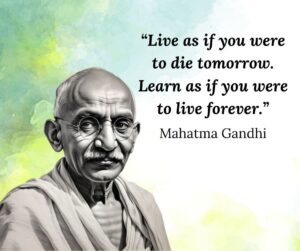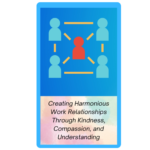Mahatma Gandhi’s words, “Live as if you were to die tomorrow. Learn as if you were to live forever,” encapsulate a philosophy that’s deeply relevant in our fast-paced, ever-evolving world. Gandhi’s message invites us to live fully in the present while nurturing a lifelong commitment to growth. Let’s delve into this profound statement, unpacking its wisdom and discovering how we can integrate it into our lives for a deeper sense of purpose, fulfillment, and continuous learning.
Living Fully in the Present
The first half of Gandhi’s quote, “Live as if you were to die tomorrow,” calls on us to approach life with urgency, passion, and an appreciation for the present moment. While we often become caught up in routines, expectations, or past regrets, Gandhi urges us to live each day as though it were our last.
This mindset shift doesn’t mean making rash decisions or abandoning long-term plans; rather, it suggests focusing on what truly matters, cherishing each experience, and fostering deep connections. When we live as if tomorrow isn’t guaranteed, we find ourselves re-evaluating our priorities, focusing on relationships, kindness, and gratitude, rather than on fleeting achievements or material gains.
Practicing Mindfulness
A vital aspect of living fully is cultivating mindfulness, a practice that involves being aware of our thoughts, feelings, and surroundings in the present. Through mindfulness, we learn to slow down and appreciate small moments, whether it’s a heartfelt conversation, a quiet cup of tea, or a walk in nature. By being present, we engage more deeply with life, opening ourselves to joy, spontaneity, and even resilience during difficult times.
Mindfulness is especially relevant today, as technology, work demands, and distractions often pull us in multiple directions. By embracing Gandhi’s philosophy and practicing mindfulness, we can bring intentionality to our days, allowing us to be genuinely present for ourselves and those around us.
Cultivating Gratitude
Living as though we may not see tomorrow also encourages a deep sense of gratitude. When we acknowledge the fragility of life, we become more aware of the blessings we often overlook: health, friendships, family, and opportunities for growth. Expressing gratitude doesn’t have to be grandiose; even a small, consistent practice—such as jotting down three things we’re grateful for each day—can shift our perspective and remind us of life’s richness.
Living with Purpose
With an awareness of life’s brevity, Gandhi also prompts us to think about our purpose. Living purposefully means aligning our actions with our values, pursuing meaningful goals, and striving to make a positive impact. It can be as simple as spreading kindness within our communities, helping those in need, or contributing our unique gifts to the world. Purpose gives our lives a sense of direction, helping us stay true to ourselves while making each day meaningful.
Learning as a Lifelong Journey
The second half of Gandhi’s quote, “Learn as if you were to live forever,” speaks to the importance of cultivating a lifelong passion for learning. Gandhi was a strong advocate of self-improvement and believed that true knowledge came from continuously seeking wisdom and expanding our horizons.
Embracing Curiosity
At its heart, lifelong learning is about curiosity—the desire to understand the world, challenge our perspectives, and grow in knowledge. When we embrace curiosity, we become students of life, exploring diverse interests, skills, and cultures. Curiosity keeps our minds open and prevents us from becoming complacent, allowing us to grow regardless of age or circumstance.
Curiosity-driven learning doesn’t require formal education; it could be as simple as reading new books, attending workshops, trying new activities, or engaging in thoughtful conversations. This attitude of exploration helps us stay adaptable in an ever-changing world.
Developing Resilience through Learning
Lifelong learning also builds resilience. Challenges, setbacks, and uncertainties are inevitable, but they become valuable lessons if we view them as opportunities for growth. Gandhi’s life exemplified resilience; he faced numerous adversities but continually sought to learn from each experience, adapting his methods and evolving his beliefs to align with his commitment to nonviolence and justice.
By embracing learning as a lifelong journey, we foster resilience and a growth mindset, empowering us to overcome obstacles and view setbacks as stepping stones rather than endpoints.
Fostering Emotional Intelligence
Learning is not limited to academic knowledge; it also encompasses emotional intelligence, empathy, and interpersonal skills. By prioritizing self-awareness and understanding others, we build stronger, more compassionate connections. Learning to manage emotions, communicate effectively, and nurture empathy contributes significantly to personal growth and harmonious relationships. Gandhi’s own journey illustrates the importance of emotional growth in achieving deeper understanding and forgiveness, qualities that are crucial for societal progress and unity.
Expanding Your Perspective
Learning as though we were to live forever also encourages humility, as it reminds us that there’s always more to understand. Gandhi believed in the power of broadening perspectives, often studying religions, cultures, and philosophies beyond his own. This open-mindedness enriched his worldview and made him a unifying figure across diverse communities.
When we embrace diverse perspectives, we gain insights that can deepen our empathy, enrich our knowledge, and reduce prejudice. Today, with access to global perspectives at our fingertips, we can cultivate this same openness, challenging our assumptions and fostering understanding in a world that sometimes feels polarized.
Applying Gandhi’s Wisdom to Our Daily Lives
Incorporating Gandhi’s wisdom into our lives can begin with small, intentional actions:
- Set Daily Intentions: Start each day by identifying one thing you want to appreciate or achieve, aligning with the mindset of “living as if you were to die tomorrow.” Whether it’s calling a loved one or completing a project with dedication, daily intentions can bring greater purpose to your day.
- Cultivate a Reading Habit: Make time for learning by reading about topics that inspire you. Expand your knowledge beyond your current interests, and be open to new ideas. This practice will deepen your understanding of the world, fulfilling Gandhi’s call to “learn as if you were to live forever.”
- Practice Reflection: Spend a few minutes each day reflecting on what you learned or experienced. Reflection can help you internalize your day’s lessons, promoting personal growth and gratitude. Gandhi himself was known for his reflective practices, allowing him to continually refine his ideas and actions.
- Challenge Yourself: Step outside your comfort zone by trying something new. Whether it’s learning a new language, skill, or craft, challenging yourself can foster resilience, humility, and confidence. This commitment to growth supports Gandhi’s view of continuous learning.
- Give Back: Living purposefully also involves service to others. Volunteer your time, share your knowledge, or help someone in need. Gandhi’s life was defined by selfless service, reminding us that our impact on others is an integral part of meaningful living.
The Legacy of Gandhi’s Message
Gandhi’s message calls for balance—a life filled with intention and urgency, coupled with a mind constantly eager to learn and evolve. While the world may look very different from Gandhi’s time, the timelessness of his words reminds us that life’s essential truths remain unchanged. We can find meaning by embracing the present and remaining lifelong learners, moving through life with both purpose and humility.
Living as if today were our last empowers us to cherish each moment, and learning as though we were to live forever keeps us on a path of growth and discovery. Gandhi’s words are not merely advice; they are a call to action, inviting us to live fully, learn ceaselessly, and find joy in both.


















